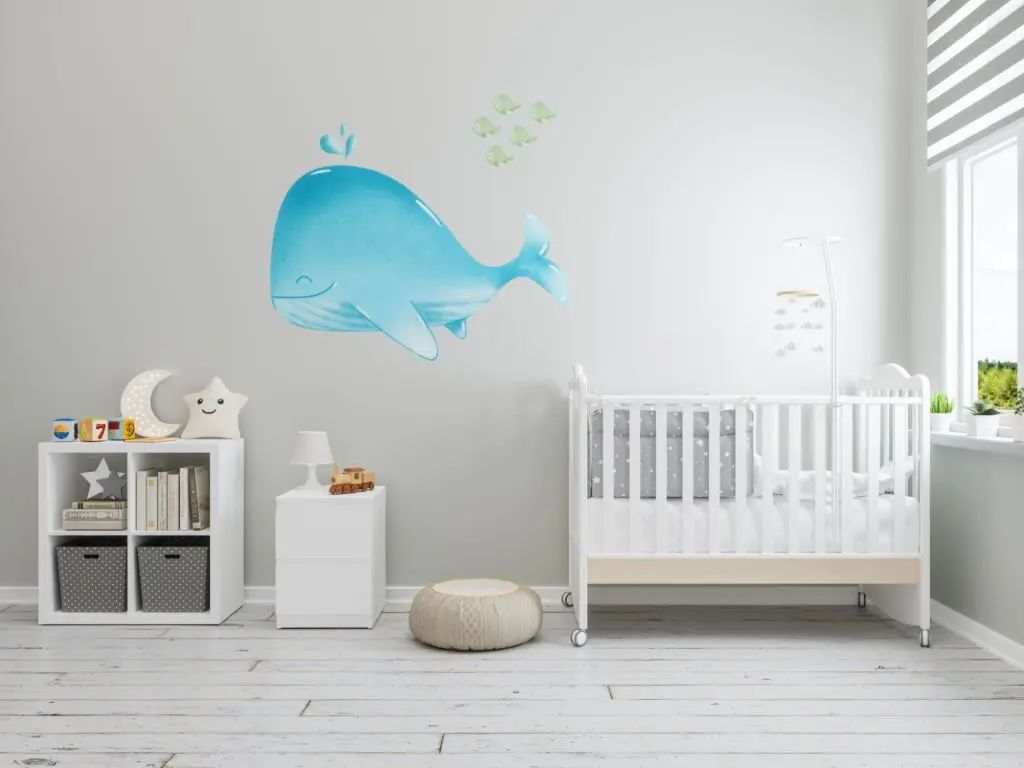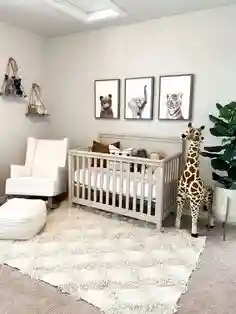When Should Baby Sleep In Crib In Their Own Room

Introduction To When should baby sleep in a Crib in their own room
Deciding when a baby should start sleeping in their room can be challenging for new parents. It is a transition that needs careful planning and consideration. This article will explore this topic in detail, providing guidance and tips for a smooth transition when a baby sleeps in crib in their own room.
What does a baby’s room or nursery look like?

A baby’s room or nursery is usually decorated with soft, calming colors and filled with baby essentials such as a crib, changing table, and a comfortable chair for nursing or feeding. It should be quiet, dark, and the temperature should be comfortable – not too hot or too cold. The crib should be free of pillows, toys, and blankets to minimize suffocation risks.
Should Babies Sleep in Their Own Room?
The answer largely depends on the family’s comfort and the baby’s readiness. However, the American Academy of Pediatrics (AAP) recommends room-sharing (not bed-sharing) for the first 6 months to a year for safety reasons. It can reduce the risk of sudden infant death syndrome (SIDS).
Can babies sleep in their own room from birth?
While some parents choose to have their newborns sleep in a separate room, keeping the baby in the same room for the first few months is generally safer. This enables easier feeding and comfort during the night.
Can parent-baby room-sharing be dangerous?
Room-sharing isn’t typically dangerous if done correctly. The key is to avoid bed-sharing, which can increase the risk of SIDS. The baby should have a separate sleeping surface, like a bassinet or a crib.
Do babies sleep better in their own rooms?
Some research suggests that babies may sleep longer stretches when they have their own room, mainly as they grow older and their sleep patterns become more established.
Which age is optimal for transitioning a baby to their room?
Most experts agree that the best time to transition a baby to their own room is around six months of age. However, every baby is different, so parents should consider their baby’s unique needs and their family dynamics.
Signs your baby is ready for their own room
Your baby’s six months or older
This is the recommended age by many pediatricians for transitioning a baby to their own room.
Your baby’s waking frequently
If your baby wakes up frequently at night, and the presence of parents seems to be more of a distraction than a comfort, it might be time to consider a separate room.
Your sleep is suffering.
If the baby’s noises, even during their sleep, are causing you to lose sleep, it might be time to move them into their room.
You’re expecting a new baby
If a new baby is coming, you might want to start transitioning the older sibling to their room to make space.
You’ve decided to sleep train.
If you’re planning to sleep train your baby, moving them to their own room can often make the process easier.
Tips for smoothly transitioning your baby to their Room
Spend time in the new room
Before making the switch, spend some waking hours in the new room with your baby. This will help them get used to the environment.
Use established sleep cues
Maintain the same sleep cues and routines you had when the baby was in your room.
Set the speed that’s right for your family
Every family and baby is unique. Some might be ready for the switch overnight, while others may need a slower transition.
Be patient
Transitioning to a new room is a big change for your baby. Be patient, offer comfort, and know that it might take some time.
Conclusion on to when Should Baby Sleep In Crib In their Own Room
Transitioning your baby to their own room is a significant step. It’s essential to ensure both you and your baby are ready for this change. Remember, there’s no ‘one-size-fits-all’ approach – what works best for one family might not work for another. The key is to be patient, flexible, and responsive to your baby’s needs.
Also Read:
- How To Convert Baby Cache Crib To Toddler Bed: A Comprehensive Guide
- When To Move Baby To Crib : A Comprehensive Guide
- How To Keep Baby From Rolling Over In The Crib: An Ultimate Guide
- How to Get a Baby to Sleep in a Crib: Your Ultimate Guide
FAQs on when Should Baby Sleep In Crib In their Own Room
Should I keep my newborn in a separate room from me?
The AAP recommends room-sharing for at least the first six months. However, every family is different, and it’s important to do what feels right for you and your baby.
How old should a baby be to sleep in a separate room?
Most experts suggest around 6 months is a good time, but it can vary depending on the baby’s readiness and the family’s comfort.
Why do people’s babies sleep in separate room (in the USA)?
Many parents find that both they and their baby sleep better when the baby has their own room. This also provides the baby with a designated space for sleep, helping establish good sleep habits.
Can I put my infant to sleep downstairs and then move them?
Having the baby sleep in your room for the first few months is generally safer. Moving a sleeping baby can also risk waking them up.
When should I move my child out of the crib? She is three years old.
Typically, children move from a crib to a toddler bed or a regular bed between ages 1.5 and 3.5. If your child is trying to climb out of the crib or is too big, it’s likely time to make the switch.
